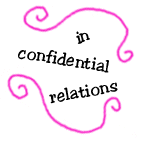 Q Dear Miss Abigail:
Q Dear Miss Abigail:
I’m going through puberty and I don’t know how to talk about it with my mom, yet me and my friends talk about it all the time. Is it wrong? What should I do?
Signed,
Deeply Confused
A Dear Confused:
I’m sure your friends have interesting things to say about puberty, but I think you should trust your mom and open up to her about what you’re going through. Heck, she was a girl once, too, and I bet she knows a little bit about the subject. Here are some thoughts about parents and their role in educating their kids (I know, kinda preachy and boring, but heck, it’s from 1910). It’s from Education in Sexual Physiology and Hygiene, written by Philip Zenner.
1910: The Teacher
![]() The parent should be the ideal teacher. After a few years of preparation with lessons of reproduction in plants and birds and the like, the mother might tell the story of mother and babies when the child is about eight years old, an age when it is especially curious, and when it is likely to get misinformation from its companions.
The parent should be the ideal teacher. After a few years of preparation with lessons of reproduction in plants and birds and the like, the mother might tell the story of mother and babies when the child is about eight years old, an age when it is especially curious, and when it is likely to get misinformation from its companions.
As the child gets older it should receive other necessary lessons at the appropriate time; for instance, the mother teaches the girl about the menses, motherhood, social disease, and a pure mind; the father the boy about seminal emissions, self-abuse, continence, and social disease.
One great advantage of parent as teacher, is that the child is likely to make a confidant of him and not go elsewhere, when seeking information on these subjects, a benefit to the child which can scarcely be overestimated. For the child should be in confidential relations with some one to whom it turns freely for advice in such matters, and it is fortunate indeed if that confident is a wise parent.
So clearly, the parent might be the ideal teacher. But for the purpose he must be wise and discreet, equipped with knowledge, understand and be in sympathy with his children, and be willing to do his duty by them.![]()
Source: Zenner, Philip. Education in Sexual Physiology and Hygiene. Cincinnati, Ohio: Robert Clarke Company, 1910.
~ pp. 112-13 ~